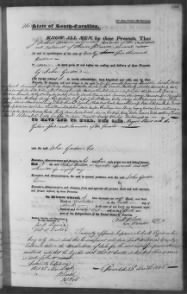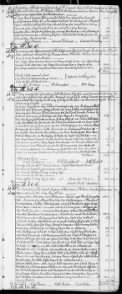

Part of Fold3’s Black History Collection is the South Carolina Estate Inventories and Bills of Sale, 1732-1872. Like the title suggests, this item contains bills of sale, inventory and appraisement books, and inventories of estates from the Charleston area of South Carolina between 1732 and 1872. It is a joint project with the South Carolina Department of Archives and History, Family Search, and the Lowcountry Africana group.
Among other uses, this publication can be invaluable for tracking down African American ancestors in the Charleston area, especially if they were slaves. Because slaves were considered property, when they were sold, a bill of sale was filled out, and when an estate was appraised for tax or probate purposes, slaves were listed and appraised along with the other items belonging to the estate. Such documentation is what makes this collection such a rich resource for finding slave ancestors. However, be aware that since slaves didn’t always have surnames, you’ll most likely need to look for them in this collection through the name of the slave owner.
Some examples of bills of sale and estate inventories include:
- A bill of sale from 1826 for about 100 slaves, listed by given name
- A bill of sale from 1804 for 3 slaves that provides both their American and African names
- A 1757 inventory for the estate of Richard Cochran Ash that lists multiple slaves and their values, including one that was a runaway
- An 1827 inventory for the estate of Thomas Drayton that lists his 160 slaves by family group

An important thing to remember in African American genealogy is that not all African Americans living in antebellum America were slaves—hundreds of thousands, even in the South, were free. You’ll see this reflected within this collection by the presence of inventories for the estates of free African Americans, which provide interesting insight into the lifestyles and possessions of free blacks.
A few examples are:
- An 1810 inventory for the estate of Joseph Morton, a “free black man”
- An 1829 inventory for the estate of John Martin Logan, a “free person”
And even if you don’t have ancestors who appear in this collection—whether slaves, slave owners, or free African Americans—it still provides a fascinating look into America’s slave-owning past. So take some time to search or browse the South Carolina Estate Inventories and Bills of Sale, 1732-1872, on Fold3.





As a historian i found this information fascinating. We all should be grateful to the late Alex Haley who did extensive geneological research which led to “Roots”
Born Jack L. Gilbert in Little Rock, Arkansas August 6, 1930 to a Mattie Vault Gilbert and a brother William M. Gilbert and a (absent) father who later died before I was two (2) years old (somewhere in Chicago, Illinois) Never knew my
father’s kindred (William M. Gilbert). Was raised with the aid of my Grandmother ( Mattie A. Wilson Vault and Luther Vault) Both grandparents were born during the period of restoration. Their parents were never discussed or known. My grand father was raised by a prominent educator (Jefferson Ish) but was treated like a slave. My great grandmother married a Alex Doutherd and had seven half brothers. I am a lost child and the patriarch of my Mothers family.
I will help you if you tell me what you want. I have to read your post again. So you are 84, so you will be in the 1940 census. Just tell me what you need.
I am 73, so I haven’t been in a census yet. Early
I thought Fold3 was primarily for military records and inventories like this would be on your other fee-based site, Ancestry. Is it available free anywhere else after February (SCDAH, for example)? Thanks.
I agree – what is this doing in Fold 3? I am disappointed in Ancestry for hiding this in Fold 3 and making us pay more for what should be in the regular Ancestry that we already pay for. I would really like to hear how this has to do with military..Ancestry, any comment??
My dtr & I have researched slaves mentioned of the deed books of the Ark-La-Tex. Also several MS counties. These records are indexed by names of slaves and have much pertinent info.
I volunteered to do some of indexing for this project. My understanding is that this collection would always be available free. You should not have to be a paid subscriber to access the collection at any time.
I agree with the comments about this not being on ancestry that we pay for instead of being on fold 3.
I am looking for my ancestors who live in South Carolina and were the parents and grandparents of my grandfather, Jeff Neal. The 1800 Census shows a connection to South Carolina, but I do not know where in South Carolina. If anyone can let me know if there were any families in the Charleston, South Carolina area with the surname, Neal, I would be most appreciative.
@Isaac L. Prentice – a lot of Neals all over South Carolina. Lots of Neals in the upcountry, which is where the majority of Scots-Irish settled in the 1760s and 1770s. Would need more info to give you any detailed info. Who precisely are you referring to in the 1800 census and where are they located at that time? Are you looking for slave or white ancestors?
I’ll have to chime in and ask as others have, why is this is on Fold3? I’m failing to see the military connection.
Why is this on Fold3 not that it is not interesting but this is not the proper place.
Surely, historically speaking, and having an after affect…there is a theory… and (authority) mandates people and (people) construe rewriting history, although “providing proof” and knowledge, thereto nevered freed…hereinafter another story “Title” , “CHAINS OF COMMANDS “…
People actually fines it difficult to find the truth behind the “lines”, of liers. And the liers actually act LIKE it’s Mandatory. ..SMH